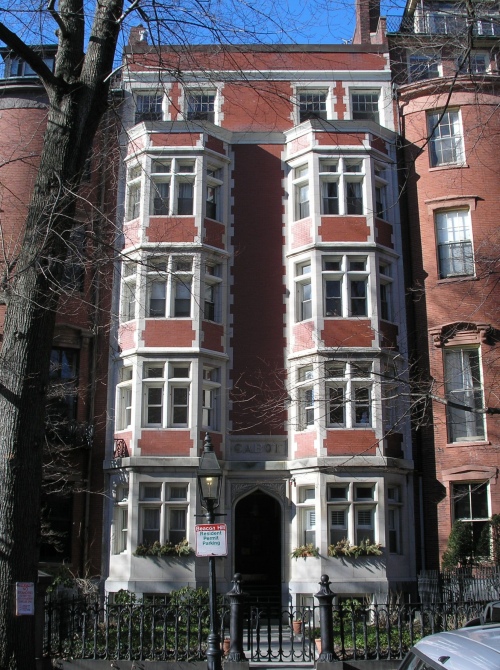65 Mount Vernon Street, Boston (1903)

65 Mount Vernon Street in Boston was the site of the residence of Henry Cabot Lodge, the senator and his son, George Cabot Lodge, the poet and dramatist. There is a 1911 biography of George Cabot Lodge, who died very young, written by Henry Adams, and an introduction to his works by Theodore Roosevelt. Although Henry Cabot Lodge is listed as living at 65 Mt. Vernon in 1894, in 1903 an apartment building, known as the Cabot, had been built at the address. One of the residents to move into the new building that year was Charles S. Hopkinson, the portrait painter and landscape watercolorist, who lived there from 1903, the year of his marriage to Elinor Curtis, to 1905. The building seems to have been inspired by the Jacobethan style.
Why is it that such descriptions completely omit the mention of the wives and mothers of such men? (After all, we supposedly have moved beyond the time when women were second-class citizens.) One would think that only “Cabot” (the name those who knew him called Henry Cabot Lodge) and Bay lived at their Boston, Nahant, and Massachusetts Avenue (D.C.) homes.
Anna “Nannie” Cabot Mills Lodge — wife of Henry Cabot Lodge, mother of George “Bay” Cabot Lodge, Constance Davis Lodge and John Ellerton Lodge — not only should be mentioned, but celebrated. Nannie Lodge — daughter of an admiral and a renowned intellectual — was known throughout the U.S. and Europe for her brilliance, wit, beauty and kindness. She was not only Cabot’s editor (he neither delivered speeches nor published his many articles and books without Nannie’s prior review and approval), but very possibly, his ghost writer on occasion.
Political and intellectual leaders such as Theodore Roosevelt, John Hay, and Cecil Spring-Rice (Britain’s ambassador to the U.S.) adored Nannie and often leveraged her legendary persuasive powers to try to swing Cabot toward more progressive and enlightened political positions. Roosevelt once said that she “looked like queens should, but never do,” and Spring-Rice (an accomplished poet) wrote a book of sonnets about her that he gave to Cabot shortly after her death in 1915.
If Nannie Lodge had been born a century later, her legacy may well have outshone that of the arrogant, acerbic and narcissistic Henry Cabot Lodge.